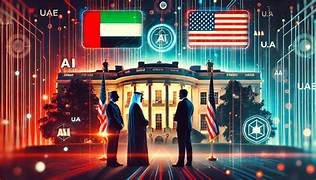The UAE is steadily charting a path toward becoming a global leader in artificial intelligence (AI), with a bold vision of pivoting its economy away from reliance on fossil fuels. Dubai, the glittering metropolis on the edge of the Arabian desert, known for its towering skyscrapers and rapid growth, now stands at the forefront of this ambitious tech revolution.

AI-Driven Lawmaking: A Game Changer
In a groundbreaking development, the UAE has announced plans to become the first nation to use AI for drafting and amending laws. This AI system is designed to comb through a vast database of federal laws, court rulings, and government services to proactively provide legal updates, significantly accelerating the lawmaking process by up to 70%. The new system will be overseen by the Regulatory Intelligence Office, a specialized unit that will manage the AI’s integration into the nation’s regulatory framework.
Sheikh Mohammad bin Rashid Al Maktoum, the UAE’s Vice President, Prime Minister, and ruler of Dubai, hailed this initiative as part of the country’s efforts to enhance efficiency and precision in governance. However, some experts have raised concerns about the risks of AI producing unreliable outputs or making flawed legal interpretations.
Beyond Drafting Laws: Real-Time Adaptation
The AI system’s role goes beyond drafting laws. It will also track the real-world impact of legislation, allowing the government to adjust laws in real time. This dynamic approach to legislation is aimed at keeping the legal system agile and responsive to the evolving needs of the UAE’s population and economy. However, the potential for AI to misinterpret complex legal nuances remains a critical challenge.
AI in the UAE: National Priority
The UAE has made AI a national priority, with substantial investments through its sovereign wealth vehicle, MGX. This tech-focused entity, backed by Mubadala and G42, has been tasked with investing billions in AI infrastructure, including data centers and semiconductor manufacturing facilities. The UAE government’s strong centralization allows for rapid technological experimentation, setting the nation apart from others in its pursuit of AI leadership.
In addition to these investments, the UAE has unveiled the Falcon large language model (LLM), developed by the Technology Innovation Institute. This initiative reflects the UAE’s ambition to drive innovation and develop AI technologies domestically, reducing reliance on foreign models.
Infrastructure to Support AI Growth
The UAE’s push for AI leadership extends to its infrastructure as well. E&, a telecom company, is involved in the development of a 45,000-km long undersea cable network, while G42’s Khazna is building essential data infrastructure. Additionally, Mubadala’s investment in Yondr, an American data-center developer, and potential talks with TSMC to establish a semiconductor foundry highlight the UAE’s drive to build the necessary foundations for a thriving AI ecosystem.
The Road Ahead: Balancing Geopolitical Risks
While the UAE’s AI ambitions are bold, geopolitical risks remain a concern. The growing tensions between the US and China could pose challenges for the UAE, as it relies on both American companies for technological and capital support and Chinese players for hardware and software solutions. These developments may force the UAE to make strategic decisions regarding its international alliances, particularly in the AI and technology sectors.
Conclusion
The UAE is determined to solidify its position as a global tech leader, with AI playing a central role in its vision for the future. While the potential benefits of AI-driven regulation and digital transformation are immense, the challenges surrounding AI’s reliability and geopolitical complexities will require careful management. The UAE’s massive investments in AI infrastructure, coupled with its unique governance model, place it on a path to reshape its economy and legal system — away from fossil fuels and toward a tech-driven future.









